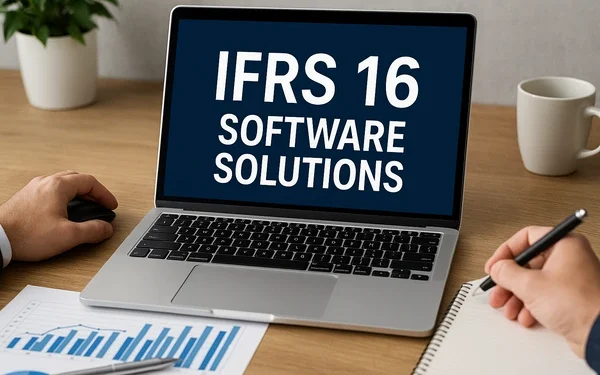When the IFRS 16 lease accounting standard came into full force in 2019, many finance teams across the UK felt a collective tremor ripple through their spreadsheets. Gone were the days of casually listing lease expenses in the footnotes. Suddenly, companies had to drag those leases onto the balance sheet—complete with right-of-use assets, lease liabilities, and reams of recalculated depreciation schedules.
Sound exhausting? It is. But thankfully, a new generation of IFRS 16 software has swooped in to make the process not only manageable, but in some cases, genuinely efficient.
From FTSE 100 firms to growing mid-sized companies, businesses across the UK are embracing lease accounting tech to take the stress out of compliance—and uncover new efficiencies along the way.
A Standard That Demanded a Digital Response
Let’s start with the obvious: IFRS 16 brought sweeping change. Instead of off-balance-sheet lease disclosures, lessees now have to recognise almost all leases as liabilities with corresponding assets. This meant reassessing lease terms, discount rates, payment schedules, renewal options, and more—across property, equipment, vehicles, and even quirky contracts like office printers or data servers.
Manual spreadsheets, once the backbone of many finance functions, quickly buckled under the weight of this complexity.
Enter IFRS 16 software—purpose-built platforms designed to automate lease recognition, streamline calculations, handle remeasurements, and generate auditable reports. For UK businesses, especially those managing a variety of lease types across different departments, this was more than a nice-to-have. It became essential.
The Real Benefits: More Than Just Compliance
For many finance leaders, the initial driver for adopting lease accounting software was simple: compliance. Get the auditors off your back. File accurate statements. Avoid material misstatements.
But as UK businesses started implementing these tools, they discovered broader benefits that extended well beyond box-ticking.
The best IFRS 16 solutions don’t just crunch numbers. They provide data visibility and workflow structure that empowers businesses to:
- Centralise lease data across departments, locations, and asset classes
- Automate amortisation schedules, lease liability roll-forwards, and interest calculations
- Integrate seamlessly with ERP systems like SAP, Oracle, and NetSuite
- Support multi-entity consolidation, crucial for companies with UK and EU operations
- Generate scenario-based reporting, such as lease vs. buy analyses or short-term lease planning
These aren’t just “compliance features”—they’re tools that enable strategic financial decision-making.
Use Cases from Across the UK
Let’s look at how different UK sectors are leveraging IFRS 16 software in practical, often surprising ways.
Retailers with large physical footprints—think department stores or supermarket chains—are using lease tech to manage hundreds of property leases efficiently. These businesses often face rolling renewals, index-linked rent adjustments, and cross-country lease variations. IFRS 16 tools automate it all, flag remeasurement triggers, and help track the financial impact of negotiations.
Meanwhile, logistics and distribution firms are applying lease software to vehicle fleets. Here, short-term contracts, service agreements, and variable usage terms make accounting especially tricky. Good software lets them capture every lease variation without drowning in admin.
Even professional services firms—law firms, consultancies, and agencies—are leaning on these tools for managing office space, IT infrastructure, and leased equipment. It’s not about quantity; it’s about clarity. With real-time reporting dashboards, they can quickly see the P&L and balance sheet impacts of every lease decision.
Not All Software Is Created Equal
Just like any tech purchase, choosing the right IFRS 16 software can make or break your implementation.
Some tools are cloud-native, intuitive, and easy to onboard. Others feel like they were designed by accountants for accountants—with interfaces straight out of 2004.
UK businesses evaluating options often look at:
- Scalability: Will this tool still work if we double in size or expand overseas?
- Ease of integration: Can it talk to our finance stack (ERP, GL, reporting)?
- Audit trail transparency: Will the auditors love or loathe it?
- User access control: Can legal, facilities, and finance all collaborate securely?
- Customer support quality: Is there someone to call when HMRC deadlines loom?
Various firms have all gained traction in the UK market, though the best fit often depends on sector, complexity, and existing infrastructure.
A Win for Finance—and the Planet?
Here’s a curveball: some UK companies are discovering that better lease accounting also improves sustainability planning.
How? Once lease data is centralised and structured, it becomes a goldmine of asset utilisation insight. Companies can spot underused space, redundant vehicles, or inefficient lease structures. That feeds directly into ESG efforts—cutting waste, streamlining resources, and supporting greener procurement choices.
In this way, IFRS 16 software isn’t just helping businesses meet accounting standards—it’s helping them meet net-zero goals too.
The Future: AI and Predictive Analytics
The most exciting part? We’re just getting started.
The next wave of IFRS 16 tools are incorporating AI and machine learning to predict lease remeasurements, flag inconsistencies, and even help automate contract reviews. Imagine uploading a commercial lease agreement and having the system extract key clauses, calculate terms, and suggest accounting treatment—all within minutes.
Some platforms are experimenting with predictive analytics that forecast the balance sheet impact of lease renegotiations, economic shifts, or interest rate changes.
For UK businesses trying to stay agile in uncertain times (Brexit hangover, inflation, supply chain crunches—you name it), this kind of forecasting is invaluable.
Final Thoughts: The Numbers Behind the Numbers
At its core, IFRS 16 is about visibility. It forces companies to confront the financial reality of leases—and now, thanks to intelligent software, it helps them manage that reality with clarity and control.
In the UK, where compliance expectations are high and audit scrutiny is only growing, having a robust, reliable lease accounting system is no longer optional. It’s the difference between reacting and planning, between spreadsheet chaos and CFO confidence.
And as more firms discover the wider benefits of automation, transparency, and real-time reporting, IFRS 16 software is transforming from a compliance necessity into a strategic accounting advantage.
So yes—it started with lease liabilities. But for savvy UK businesses, it ends with something far more powerful: informed decision-making.














